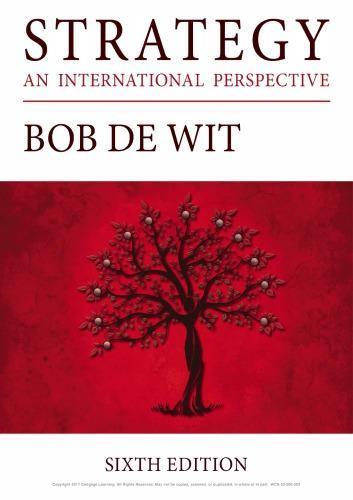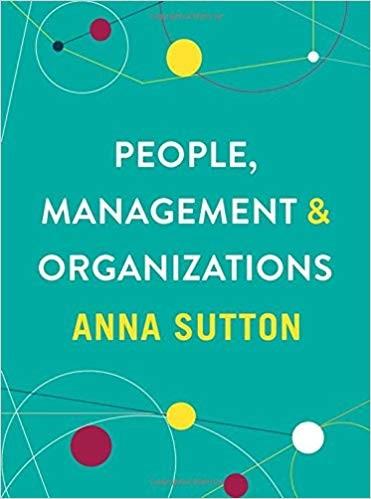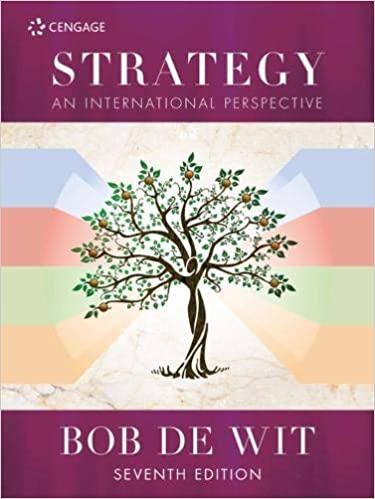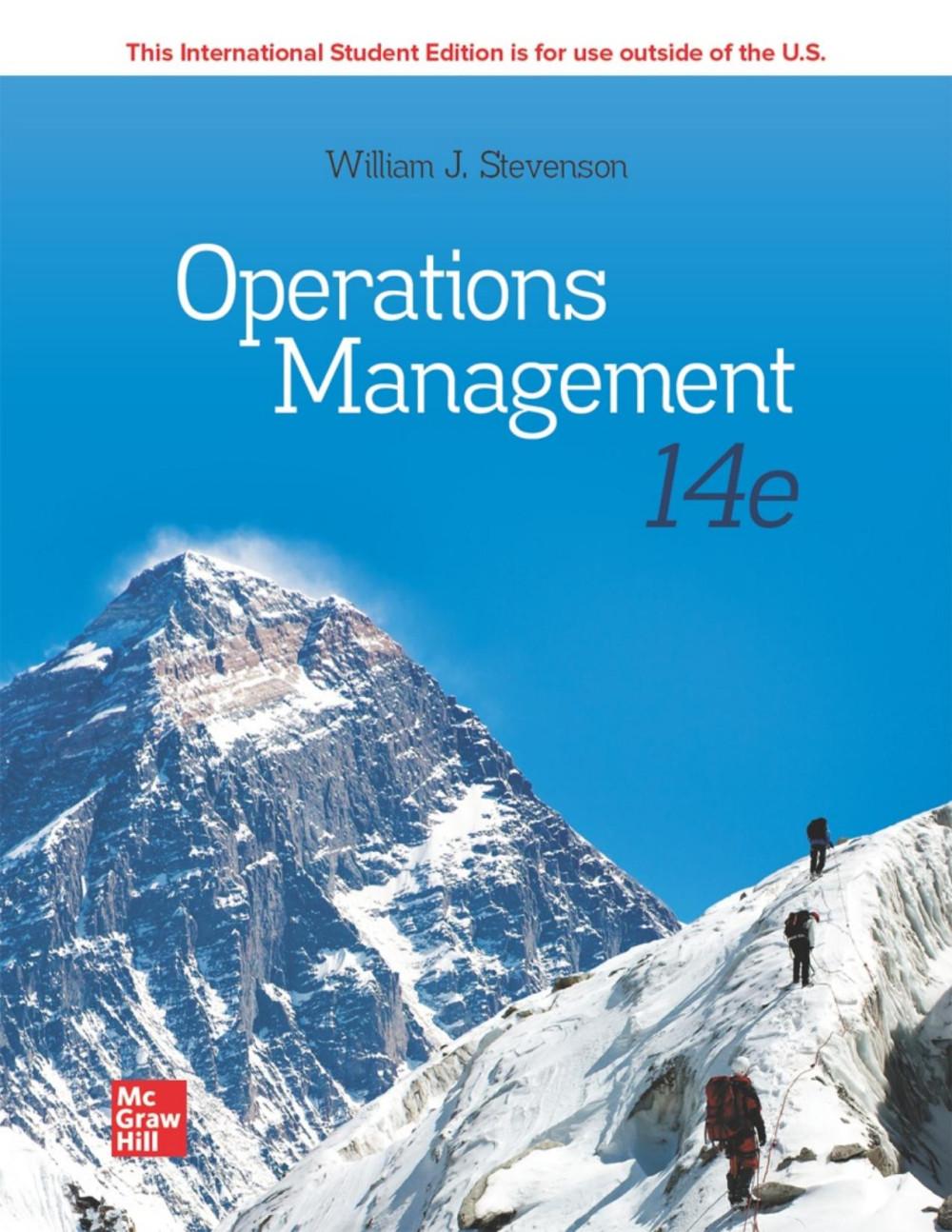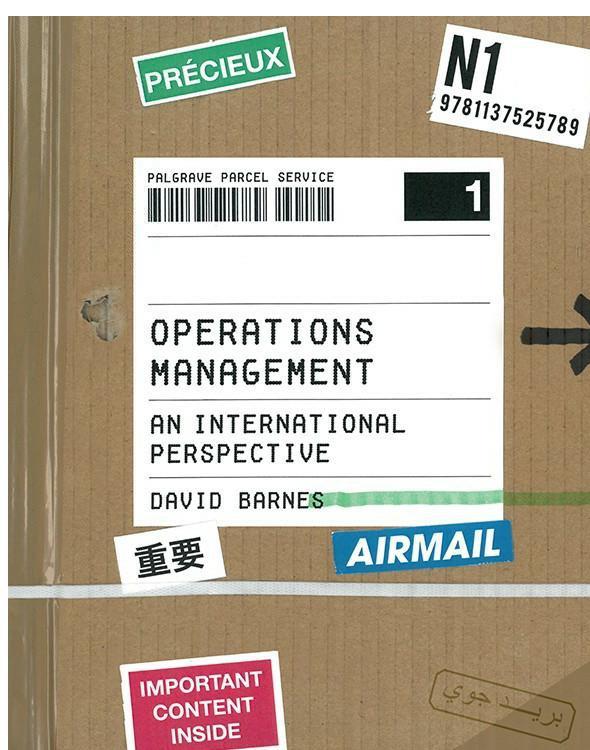16. Emerging Challenges in Operations
CONTENTS
Tables and Figures
Preface
Letter to the Student
Letter to the Lecturer
Case Study Grid
Tour of the Online Resource Centre
About the Author
Guided Tour of the Book
Author’s Acknowledgements
Publisher’s Acknowledgements
Part 1: Introduction to Operations Management
1.Operations Management
INTRODUCTION
THE TRANSFORMATION MODEL
DIFFERENT TYPES OF OPERATIONS
SERVICE OPERATIONS
THE CHANGING NATURE OF OPERATIONS MANAGEMENT
Moving beyond the factory
The increased importance of the supply network
The growing importance of services
THE INTERNATIONAL CONTEXT FOR OPERATIONS MANAGEMENT
Technological
Political
Sociocultural
Economic
Internationalization theories
Vernon’s product cycle theory
Dunning’s eclectic theory
Stage theories
THE INTERNATIONALIZATION OF SERVICES
Separated services
Demander-located services
Provider-located services
Peripatetic services
CHALLENGES OF OPERATING INTERNATIONALLY
BENEFITS FROM OPERATING INTERNATIONALLY
2.Operations Performance
INTRODUCTION PERFORMANCE OBJECTIVES
Business-level strategy
Functional-level strategy
OPERATIONS MANAGEMENT AND STRATEGY
OPERATIONS STRATEGY
OPERATIONS STRATEGY – PROCESS
Top-down
Bottom-up
Market-led
Operations-led
OPERATIONS STRATEGY – CONTENT
Structure
Infrastructure
INTERNATIONAL OPERATIONS STRATEGIES
Market access strategy
Resource-seeking strategy
THE INTERNATIONALIZATION OF OPERATIONS MANAGEMENT AND THE TRANSFORMATION MODEL
Inputs
The process
Outputs
ENTERING FOREIGN MARKETS
Direct export
Joint venture
Establish a sales subsidiary
Establish a production facility
INTERNATIONAL OPERATIONS AND BUSINESS STRATEGY
Global sourcing
Location
Network effects
Competition
Part 2: Structural Issues
4.Facilities
INTRODUCTION
LOCATION DECISIONS
Weighted scoring
Centre of gravity
THE SCALE AND SCOPE OF OPERATIONS FACILITIES
THE STRATEGIC ROLE AND PURPOSE OF OPERATIONS FACILITIES
The primary strategic reason for the facility
The level of competence on-site
THE CONFIGURATION OF OPERATIONS FACILITIES
THE DYNAMICS OF CAPACITY MANAGEMENT
6.Process Design and Technology
INTRODUCTION
DIFFERENT PROCESS TECHNOLOGIES
Material-processing technologies
Customer-processing technologies
Information-processing technologies
DECISION-MAKING ABOUT
TECHNOLOGY
THE CRUCIAL ROLE OF ICT
Localized exploitation
Internal integration
Business process redesign
Business network redesign
Business scope redefinition
TECHNOLOGY ADOPTION STRATEGIES
TECHNOLOGY TRANSFER
PROCESS CHOICE
Project
Jobbing
Batch
Mass
Continuous
Professional services
Mass services
Service shop
THE LAYOUT OF PROCESS EQUIPMENT
Fixed position layout
Process layout
Product layout
Group (or cellular) layout
THROUGHPUT
QUEUING SYSTEMS
Single line, single server
Single line, multiple servers
Multiple lines, multiple servers
The psychology of queuing
7.The Supply Network
INTRODUCTION
THE IMPORTANCE OF PURCHASING
SUPPLY NETWORKS
THE CONFIGURATION OF THE SUPPLY NETWORK
THE COORDINATION OF THE SUPPLY NETWORK
COLLABORATIVE PLANNING, FORECASTING AND REPLENISHMENT (CPFR)
The SCOR model
THE OUTSOURCING DECISION
GLOBAL SOURCING
RELATIONSHIPS WITH SUPPLIERS
SINGLE VERSUS MULTI-SOURCING
Part 3: Infrastructural Issues
8.Planning and Control
INTRODUCTION
THE PRINCIPLES OF PLANNING AND CONTROL
THE ACTIVITIES OF PLANNING AND CONTROL
Strategic operations planning
Aggregate planning
Master production scheduling
Activity scheduling
Expediting
MEETING CUSTOMER DEMAND
P:D RATIOS
PLANNING AND CONTROL PHILOSOPHIES
Supply-push
Demand-pull
COMPUTER-BASED PLANNING AND CONTROL
OPTIMIZED PRODUCTION TECHNOLOGY (OPT)
9.Inventory Management
INTRODUCTION
TYPES OF INVENTORY
THE ROLE OF INVENTORY
TYPES OF DEMAND
MANAGING INDEPENDENT DEMAND INVENTORY
The order quantity decision
The order timing decision
INVENTORY LEVEL ANALYSIS
MANAGING DEPENDENT DEMAND INVENTORY
THE CUSTOMER SERVICE ANALOGY
10.Lean Operations
INTRODUCTION
LEAN PRINCIPLES
SYNCHRONIZATION
LEAN AS A PLANNING AND CONTROL SYSTEM
Line balancing
Kanban
LEAN AS AN INVENTORY CONTROL SYSTEM
WASTE ELIMINATION
CONTINUOUS IMPROVEMENT
THE INVOLVEMENT OF ALL EMPLOYEES
LEAN TECHNIQUES AND PRACTICES
Smooth flow
Focus on set-ups
Standardized procedures
Simplicity in equipment and layout
Total quality
Product design
Lean supply
Total people involvement
Total productive maintenance
LEAN IN SERVICES
LEAN AS A BEST PRACTICE MODEL
11.Quality Management
Gap : the gap between customers’ expectations and management’s perceptions of customers’ expectations
Gap : the gap between management’s perception of customers’ expectations and the product specification
Gap : the gap between the specification and the customers’ experience of the product
Gap : the gap between the customers’ experience and the external communications to customers
Gap : the gap between the customers’ expectations and the customers’ experiences
MEASURING QUALITY
Operations measures
Financial measures
Customer measures
STATISTICAL QUALITY CONTROL
Acceptance sampling
Statistical process control charts
THE ISO SERIES QUALITY MANAGEMENT SYSTEM
ISO AND TQM
QUALITY AWARDS
SIX SIGMA
GLOBAL DIFFERENCES IN QUALITY MANAGEMENT
Other documents randomly have different content
n'y en a [138] que deux ou trois qui ayẽt les meilleurs morceaux, car ils ne les diuisent point: ils donneront par exemple la langue d'vn Orignac, & toutes ses appartenances à vne seule personne, la queuë & la teste d'vn Castor à vn autre; voila les meilleures pieces, qu'ils appellent Mascanou, la part du Capitaine. Pour les boyaux gras de l'Orignac, qui sont leurs grands delices, ils les font ordinairement rostir & en font gouster à tous, comme aussi d'vn autre mets, dont ils font grand estat, c'est le gros boyau de la beste remply de gresse, & rosty auec vne corde qui pend & tourne deuant le feu.
Au reste ils sont magnifiques en ces festins, car ils ne presentent que les bonnes viandes les separants exprés, & donnant à chacun tres abondamment, quand ils en ont.
Ils ont deux sortes de festins, les vns à manger tout, les autres à mãger ce qu'on
only two or three have the best pieces, for they do not divide them. For example, they will give the tongue of a Moose and all the giblets to a single person, the tail and head of a Beaver to another; these are the best pieces, which they call Mascanou, "the Captain's part." As to the fat intestines of the Moose, which are their great delicacies, they usually roast them and let every one taste them, as they do another dish, which they hold in high esteem,—namely, the large intestine of the beast filled with grease, and roasted, fastened to a cord, hanging and turning before the fire.
Also they are very magnificent in these feasts, for they only offer the good meat, separating it expressly, and giving to each one very abundantly, when they have it.
They have two kinds of feasts, —one at which everything is eaten; the other at which the
voudra, remportant le reste pour en faire part à leur famille. Cette derniere façon me semble loüable, car il n'y a point d'excez, chacun prend autant qu'il luy plaist de la portion qui luy est donnée; [139] voire i'oserois dire que c'est vne belle inuention pour conseruer l'amitié entr'eux, & pour se nourrir les vns les autres: car ordinairement les peres de famille ne mangent qu'vne partie de leurs mets, portans le reste à leurs femmes & à leurs enfans, le mal est qu'ils font trop souuent des festins dans la famine que nous auons enduré: si mõ hoste prenoit deux, trois, & quatre Castors, tout aussi tost 282 fut-il iour, fut-il nuict on en faisoit festin à tous les Sauuages voisins; & si eux auoient pris quelque chose, ils en faisoient de mesme à mesme temps: si que sortant d'vn festin vous allez à vn autre, & par fois encore à vn troisiesme, & vn quatriesme. Ie leur disois qu'ils ne faisoient pas bien, & qu'il valoit mieux reseruer ces festins aux iours suiuans, & que ce faisant nous ne serions
guests eat what they please, carrying away the rest to divide with their families. This last feast seems to me praiseworthy, for there is no excess, each one taking as much as he likes of the portion given to him; [139] indeed, I would venture to say that it is a happy invention to preserve friendship among them, and for each to help feed the others. For usually the heads of families only eat a part of their share, carrying the rest to their wives and children. The trouble is that their feasts come too often. In the famine through which we passed, if my host took two, three, or four Beavers, immediately, whether it was day or night, they had a feast for all the neighboring Savages. And if those people had captured something, they had one also at the same time; so that, on emerging from one feast, you went to another, and sometimes even to a third and a fourth. I told them that they did not manage well, and that it would be better to reserve these feasts for future days, and in doing this they would not be so pressed with hunger.
pas tant pressez de la faim; ils se mocquoient de moy, demain (disoient-ils) nous ferons encore festin de ce que nous prendrons; oüy mais le plus souuent ils ne prenoient que du froid & du vent.
Pour leurs festins à ne rien laisser, ils sont tres blamables, & c'est neantmoins l'vne de leurs grandes deuotions, car ils [140] font ces festins pour auoir bonne chasse, il se faut bien donner de garde que les chiens n'en goustent tant soit peu, tout seroit perdu, leur chasse ne vaudroit rien; Et remarquez que plus ils mangent plus ce festin est efficace; de là vient qu'ils dõneront à vn seul homme, ce que ie ne voudrois pas entreprendre de manger, auec trois bons disneurs, ils creueroient plustost, pour ainsi dire, que de rien laisser. Vray qu'ils se peuuent ayder les vns les autres; quand quelqu'vn n'en peut plus, il prie son compagnon de l'assister, où bien l'on fait passer son reste pardeuant les autres qui en prennent chacun vne partie, & apres tout cela s'il en reste on
They laughed at me. "Tomorrow" (they said) "we shall make another feast with what we shall capture." Yes, but more often they captured only cold and wind.
As to their "leave-nothing" feasts, they are very blamable; and yet this is one of their great devotions, because they [140] make these feasts in order to have a successful chase. They must be very careful that the dogs taste nothing of this, or all will be lost, and their hunting will be worthless. And notice that, the more they eat, the more efficacious is this feast. Hence it happens that they will give, to one man, what I would not undertake to eat with three good diners. They would rather burst, so to speak, than to leave anything. True, they can help each other; when one can eat no more, he begs his companions to assist him; or else he may pass the remains of his part along to the others, who each one take some of it, and after all this, if anything remain, it is thrown into the
le iette au feu; celuy qui mange le plus est le plus estimé, vous les entendez raconter leurs proüesses de gueule, specifiants la quantité & les parties de la beste qu'ils ont mãgé; Dieu sçait quelle musique apres le banquet, car ces Barbares donnent toute liberté à leur estomach & à leur ventre, de tenir le langage qui 284 leur plaist pour se soulager; quand aux odeurs qu'on sent pour lors dans leurs Cabanes, elles sont plus fortes que l'odeur des roses, mais elles ne sont pas si douces, vous les voyez haleter [141] & souffler comme des gens remplis iusques au gosier; & de faict comme ils sont nuds, ie les voyois enflez iusques à la gorge, encore ont ils du courage là dedans, leur cœur retient ce qu'on luy donne, ie n'ay veu que l'estomach du Sorcier mécontent de ce qu'on luy auoit donné, quantité d'autres en approchoient de bien prés, mais ils tenoient bon. I'en ay veu par fois de malades apres ces excez.
fire. The one who eats the most is the most admired. You will hear them describing the prowess of their jaws, naming the quantity and the parts of the beast which they have eaten. God knows what kind of music follows this banquet, for these Barbarians give full liberty to their stomachs and bellies, to utter whatever sounds they please, in order to relieve themselves. As to the odors that are then exhaled in their Cabins, they are stronger than the perfume of roses, but not so sweet. You see them pant [141] and blow, like people full up to their throats; and, in fact, as they are naked, I saw that they were swollen as high as their necks. Still, with it all, they have mettle there inside, for their stomachs retain what is given them. I have known only the Sorcerer's stomach to be dissatisfied with what it received; many others came very near it, but they held their own. Occasionally, I have seen some of them sick after these excesses.
Mais venons à l'ordre qu'ils gardent en ces banquets; Ceux qu'on doit traitter estans conuiez à la façon que i'ay dit, ils s'en viennent auec leur ouragan, ou escuelle leur cuillier, ils entrent dans la Cabane sans ceremonie, chacun prenant sa place comme il vient, ils s'asseoient en rond à l'entour de la chaudiere qui est sur le feu, renuersant leur plat deuant eux, leurs sieges, c'est la terre couuerte de branches de pin, il n'y a point de preseance, toutes les parties d'vn cercle sont aussi courbées, & aussi nobles les vnes que les autres, quelquesfois l'vn d'eux dira à celuy qui entre Outaiappitou, viens icy, sieds toy là.
Chacun ayant pris sa place & s'estant assis en forme de Guenon, retirant ses [142] jambes contre ses cuisses, si c'est vn festin à manger tout, on ne dit mot, on chante seulement, & s'il y a quelque Sorcier ou Manitousiou, il bat son tambour; vray qu'ils ne
But let us notice the order which they observe in these banquets. Those who are to be entertained having been invited in the way I have stated, they come each with his ouragan, or dish, and his spoon, and enter the Cabin without ceremony, each one taking his place as he comes. They seat themselves around the kettle which is over the fire, turning their plates upside down before them. Their chairs are the ground, covered with pine branches; and no order of precedence is observed. All the members of the circle are alike bent forward; and one is as noble as the other. Sometimes one will say to another who enters, Outaiappitou, "Come here, sit thou there."
Each one, having taken his place, sits in the posture of a monkey, drawing up his [142] legs against his thighs. If it is an eat-all feast, not a word is said, they only sing; and if there is a Sorcerer or Manitousiou present, he beats his drum; true, they are not
sont pas tousiours si religieux qu'ils ne tiennent quelque petit discours. Si le festin n'est pas à ne rien laisser, ils s'entretiennent vn peu de temps de leurs chasses, ou d'autres choses semblables, le plus souuent de gausseries.
286 Apres quelques discours, le distributeur du festin, qui est ordinairement celuy qui le fait, descend la chaudiere de dessus le feu, ou les chaudieres s'il y en a plusieurs, les mettãt deuant soy, & lors il fait quelque harãgue ou semet à chãter, & tous les assistans auec luy; quelquefois il ne faict ny l'vn ny l'autre, mais seulement il dit les mots de l'entrée du festin qui ne s'obmettent iamais, c'est à dire qu'il declare dequoy il est composé: par exemple il dira, hommes qui estes icy assemblez, c'est vn tel qui faict le festin, ils respondent tous du fond de l'estomac hô-ô-ô, le festin est composé de chair de Castor, ils poussent de rechef leur aspiration hô-ô-ô, il y a aussi de la farine [143] de bled d'Inde hô-ô-ô, respondent
always so strict that they do not hold some little conversation. If it is not a leave-nothing feast, they have a little conversation about their hunting, or the like, but most frequently about their pranks.
After some talk, the server of the feast, who is usually the one who gives it, takes down the kettle from the fire,—or the kettles, if there are several,—and, placing them before him, he makes a speech or begins a song, and all the others join in. Sometimes he does neither, but simply says the words at the opening of the feast, which are never omitted,— namely, he declares of what it is composed; for example, he will say, "Men who are assembled here, it is such and such a one who gives this feast." They all answer in deep chest tones, hô-ô-ô. "The feast is composed of the flesh of Beavers." They again utter this aspiration, hô-ô-ô. "There is also some [143] Cornmeal." Hô-ô-ô, they respond, to each of the different dishes.
commence; il n'y a ny honneur ny 288 blasme d'estre party le premier ou le dernier. Si le festin est de viande, il la tire auec vn baston pointu, [144] la met dans des plats d'escorce deuant soy, puis ayant ietté les yeux sur le nombre des conuiez, il la distribue comme il luy plaist, donnant à chacun abondamment, non pas egalement. Car il donnera les friants morceaux à ses confidents, voire mesme quand il a donné à tous vne bonne piece, commençant par ceux qui ne sont pas de sa Cabane, il rechargera iusques à deux & trois fois & non pas pour les autres, personne ne s'offence de ce procedé, car c'est la coustume.
Il presente ordinairement la chair au bout d'vn baston, nommant la piece ou la partie de l'animal qu'il donne, en cette façon; si c'est la teste d'vn Castor, ou d'Asne sauuage, ou d'autre animal, il dira Nichta Koustigouanime; Mon cousin, voila ta teste, si c'est vn espaule, il dira voila ton espaule, si ce sont des
served first or last. If the feast is of meat, he draws it out with a pointed stick, [144] puts it into some bark dishes before him; then, having cast his eyes over the number of guests, he distributes it as he pleases, giving to each one abundantly, but not equally. For he will give the dainty morsels to his intimate friends; and, even when he has given to each of them a good piece, beginning with those who are not of his Cabin, he will serve them again, even two or three times, and not the others. No one is offended at this proceeding, for it is the custom.
He usually offers the meat on the end of the stick, naming the piece or part of the animal which he is giving in this way; if it is the head of a Beaver or of a wild Ass, or some other animal, he will say, Nichta Koustigouanime, "My cousin, here is thy head;" if it is the shoulder, he will say, "Here is thy shoulder;" and if it is the
boyaux, il en dira de mesme; d'autresfois ils disent simplemẽt, Khimitchimi, voila ton mets: mais prenez garde qu'ils n'ont point l'equiuoque en leur langue que nous auons en la nostre. On raconte d'vn certain, lequel rencontrant son amy, luy dit par courtoisie, si i'auois quelque chose digne de vous, ie vous inuiterois à desjeusner en [145] nostre maison, mais ie n'ay rien du tout, son valet l'entendant luy repartit à la bõne foy, excusezmoy Monsieur, vous auez vne teste de veau, cela dit en lãgage Montagnais n'a rien de ridicule, pource qu'ils n'õt point d'equiuoque en ces termes, les mots qui signifient ma teste propre & la teste d'animal qui m'est donnée estants differents.
Celuy qui fait le festin & qui le distribue ne fait iamais sa part, il se contente de voir manger les autres 290 sans se rien retenir pour soy; neantmoins quand il y a peu de viures, si tost qu'il a tiré la viande de la chaudiere, son voisin ou son
intestines, he will name it in the same way; at other times they simply say, Khimitchimi, "Here is thy meat." But bear in mind that they have not the ambiguity in their language that we have in ours. They tell a story about a certain one, who, meeting his friend, said to him through courtesy, "If I had something worthy of you I would invite you to breakfast at [145] our house, but I have nothing at all." His servant hearing him, answered in good faith, "Excuse me, Sir, you have a calf's head." If this were said in the Montagnais language, there would be nothing ridiculous in it, for they have nothing ambiguous in such terms,—the words which mean "my own head" and "the head of an animal which is given me," being altogether different.
The one who gives the feast and who serves it never takes part therein, but is satisfied in watching the others, without keeping anything for himself. However, when there is a scarcity of food, as soon as the meat is taken from the kettle,

